Texts and Studies in Reformation and Post-Reformation Thought (14 vols.)
Digital Logos Edition
Overview
Study the thought and legacy of the Reformation with the Texts and Studies in Reformation and Post-Reformation Thought series. Featuring a mix of primary source documents—including Calvin’s The Bondage and Liberation of the Will—and monographs from the world’s leading Reformation scholars, each book in this series examines an essential aspect of Reformation and post-Reformation era theology. It includes studies on predestination, divine sovereignty, Luther’s “two kingdoms,” law and gospel, covenant theology, and John Calvin’s interpretation of the Psalms. Author’s examine the thought and influence of key Reformation theologians such as Heinrich Bullinger, John Owen, Philip Melancthon, and Martin Luther, placing each figure within their historical and theological context.
The Logos editions of Texts and Studies in Reformation and Post-Reformation Thought equips you for better study with cutting-edge functionality and features. Citations link directly to English translations and original-language texts, and important terms link to dictionaries, encyclopedias, and a wealth of other resources in your digital library. The Topic Guide lets you perform powerful searches to instantly gather relevant biblical texts and resources. Tablet and mobile apps let you take the discussion with you. With Logos Bible Software, the most efficient and comprehensive research tools are in one place, so you get the most out of your study.
Get more cutting-edge scholarship with Richard Muller’s Post-Reformation Reformed Dogmatics and the Reformed Historical Theological Studies Series.

- Provides cutting-edge scholarship on top Reformation and post-Reformation figures
- Examines the work and influence of post-Reformation theologians
- Presents multiple primary resources in English for the first time
- Title: Texts and Studies in Reformation and Post-Reformation Thought
- Series Editor: Richard A. Muller
- Series: Texts and Studies in Reformation and Post-Reformation Thought
- Publisher: Baker Academic
- Volumes: 14
- Pages: 3,626
- Christian Group: Reformed, Lutheran
- Resource Type: Monographs
- Topic: Reformed Theology, Lutheran Theology
Individual Titles
- The Belgic Confession: Its History and Sources by Nicolaas H. Gootjes
- The Binding of God: Calvin’s Role in the Development of Covenant Theology by Peter A. Lillback
- The Bondage and Liberation of the Will: A Defense of the Orthodox Doctrine of Human Choice against Phighius by John Calvin
- Calvin’s Theology of the Psalms by Herman J. Selderhuis
- Divine Discourse: The Theological Methodology of John Owen by Sebastian Rehnman
- Heinrich Bullinger and the Doctrine of Predestination: Author of “the Other Reformed Tradition” by Cornelius P. Venema
- Law & Gospel: Philip Melancthon’s Debate with John Agricola of Eisleben over Poenitentia by Timothy J. Wengert
- Martin Luther’s Understanding of God’s Two Kingdoms: A Response to the Challenge of Skepticism by William Wright
- Melanchthon in Europe: His Work and Influence beyond Wittenberg edited by Karin Maag
- Reformation and Scholasticism: An Ecumenical Enterprise edited by Willem J. van Asselt, Eef Dekker
- Reformed Thought on Freedom: The Concept of Free Choice in Early modern Reformed Theology by Willem J. van Asselt
- Martin Luther as Prophet, Teacher, and Hero: Images of the Reformer, 1520–1620 by Robert Kolb
- A Firm Foundation: An Aid to Interpreting the Heidelberg Catechism by Caspar Olevianus
- An Introduction to the Heidelberg Catechism: Sources, History, and Theology by Lyle D. Bierma, Charles D. Gunnoe Jr., Karin Y. Maag, and Paul W. Fields
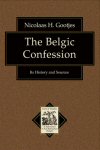
Learn the story of the historic Belgic Confession—one of the oldest and most important doctrinal statements of Reformed churches. Written in 1561, it became the doctrinal standard of Protestants in the Netherlands, despite persecution from the Roman Catholic government. This book, the first comprehensive study of the Begic Confession, examines the document’s early history, authorship, sources, revisions, authority, and its relationship to John Calvin and Theodore Beza.
The Belgic Confession of 1561 was the most significant confessional document to emerge from the Reformation in the Netherlands in the sixteenth century. How surprising, therefore, that this volume is the first full-length introduction to the origin and history of the confession to appear in English! The author has provided us with a careful and comprehensive treatment of [its] historical development. It is a book we have been awaiting for a long time."
—Lyle D. Bierma, Jean and Kenneth Baker Professor of Systematic Theology, Calvin Theological Seminary
Nicolaas H. Gootjes is professor of dogmatology at the Theological College of the Canadian Reformed Churches in Hamilton, Ontario.
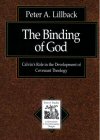
Explore John Calvin’s relationship to covenantal thought, and trace the historical development of “covenant” as a rubric for theology. Peter Lillback carefully examines Calvin’s writings, seeking to unveil the role of covenant theology in the great Reformer’s thought. Lillback’s work contributes to not only our understanding of Reformation thought, but helps to clarify how Calvin contributes to contemporary theological debates.
Lillback’s book serves well as the starting point in a vital conversation with Calvin to improve research on the theology of the Reformation.
—Paul Chung, Religious Studies Review
Peter A. Lillback is president and adjunct professor of historical theology at Westminster Theological Seminary and professor of church history at Reformed Episcopal Seminary, both located in Philadelphia. He is the author of The Practical Calvinist: An Introduction to the Presbyterian & Reformed Heritage, George Washington’s Sacred Fire, and Wall of Misconception.
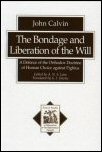
The Bondage and Liberation of the Will: A Defence of the Orthodox Doctrine of Human Choice against Pighius
- Author: John Calvin
- Editor: Anthony N.S. Lane
- Translator: G.I. Davies
- Series: Texts and Studies in Reformation and Post-Reformation Thought
- Publisher: Baker Academic
- Publication Date: 1996
- Pages: 304
Dive into the complex subject of human freedom and divine sovereignty with one of history’s greatest theologians: John Calvin. Available for the first time in English, this text reveals Calvin’s engagement with the church fathers—especially Augustine—on the relationship of human will to divine grace. This edition also contains Calvin’s rejoinder to Pighius, who claimed preaching was unnecessary if salvation comes by grace alone. Edited by renowned Calvin scholar Anthony N.S. Lane, this volume contains material not found elsewhere in Calvin’s writings, providing a fuller exposition of his thinking on a controversial topic.
Lane and Davies have provided students of Calvin with an exceedingly useful tool for studying the Reformer’s views on the human will and his polemical and theological methodology.
—Raymond A. Blacketer, Calvin Theological Journal
This first English translation of an important work of John Calvin is a welcome supplement to his teachings in his Institutes.
—E. Earle Ellis, Southwestern Journal of Theology
John Calvin (1509–1564) is one of the most influential figures in world history. A French theologian, Calvin was educated at the Sorborne, University of Paris, and ministered in the Protestant cities of Geneva and Strasbourg. Though the details of his conversion to Protestantism remain enigmatic, he became the most recognizable figure of the Reformation’s second generation, leading the spread of Reformed Protestantism across Europe. His works include Institutes of the Christian Religion and commentaries on nearly every book of the Bible.
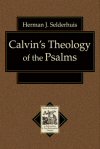
Discover what distinguished Calvin scholar Herman Selderhuis believes lies at the heart of Calvin’s theology—that God is at the center of all things. Calvin’s Theology of the Psalms demonstrates how this rubric governs Calvin’s commentary on the Psalms, drawing parallels to Calvin’s own biography. Selderhuis argues that Calvin’s work is fundamentally oriented to the first person of the trinity and that Calvin uses the Psalms to speak of God’s attributes.
Selderhuis manifests the breadth of grasp and dexterity with detail in Calvin’s Theology of the Psalms that have made him an internationally recognized authority on both Calvin and the Reformation.
—John C. Clark, Calvin Theological Journal
Herman Selderhuis is professor of church history and church polity at the Theologische Universiteit Apeldoorn in the Netherlands. He is director of the Institute for Reformation Research, Apeldoorn, and general secretary of the International Calvin Congress. He is the author of John Calvin: A Pilgrim’s Life, A Companion to Reformed Orthodoxy, and editor of The Calvin Handbook.
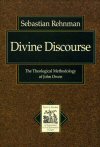
Analyze the fundamental aspects of John Owen’s theology by exploring the principles and premises undergirding his work. Sebastian Rehnman shows Owen’s direct continuity with Reformation theologians, late medieval thinkers, and patristic theologians. The theology of Owen, says Rehnman, must be understood within the context of a largely unbroken line of the Christian tradition stretching across all of church history.
This is a careful study of John Owen’s theological method through his prolegomenous discourse. Divine Discourse is a valuable study that will enhance our understanding and appreciation of Owen.
—Anthony N.S. Lane, professor of historical theology at the London School of Theology
This study of English Puritan theologian John Owen demonstrates that Owen was a highly sophisticated theologian who drew deeply on patristic, medieval, and Renaissance sources to articulate a theology that is both catholic and distinctively Reformed.
—Carl Trueman, professor of historical theology and church history, Westminster Theological Seminary
This sure-footed guide over the rough terrain of seventeenth-century Reformed prolegomena confirms [Richard] Muller’s thesis that predestination was not the organizing principle of Reformed scholasticism. Rather, Owen’s prolegomena is orthodox and scholastic as well as christocentric, pneumatological, and practical. This clear-headed balanced book will be of immense value.
—Joel R. Beeke, president and professor of systematic theology and homiletics, Puritan Reformed Theological Seminary
Rehnman’s study of Puritan John Owen’s theological prolegomena is an important contribution to contemporary work in this area that provides a sound historical analysis of the theological, philosophical, and pedagogical roots of English Puritanism and Reformed Scholasticism.
—Willem J. van Asselt, associate professor in the history of Reformed theology, Utrecht University
Sebastian Rehnman is a professor of history at the University of Stavanger, Norway.
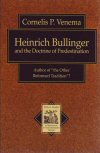
Discover Heinrich Bullinger—an over-looked but immensely important Reformation era theologian. Cornelis Venema retrieves Bullinger’s thought from the shadow of Luther, Calvin, and Zwingli, arguing for continuity between Bullinger and the later Reformed tradition. Sharpen your understanding of the Reformed heritage, and pay tribute to Bullinger as a central figure in its development.
Bullinger’s thought has never been subjected to the intensive study lavished on Calvin’s thought. Cornelis Venema takes an important step in filling this gap with this admirably precise and nuanced study of Bullinger’s doctrine of predestination.
—Robert M. Kingdom, professor of history, University of Wisconsin
Cornelis Venema’s study provides a lucid, balanced, and reliable account of Bullinger’s teaching on predestination. He clears away many misunderstandings and misrepresentations to allow Bullinger’s voice to be heard clearly.
—W. Robert Godfrey, professor of church history, Westminster Theological Seminary
This is the most careful and complete study of Bullinger’s doctrine of predestination in English. His finely nuanced arguments and ample support from the sources will make it difficult to contend any longer that Bullinger’s views of predestination and covenant diverged substantially from John Calvin’s
—Lyle D. Bierma, Jean and Kenneth Baker Professor of Systematic Theology, Calvin Theological Seminary
Venema’s work presents a significant challenge to those who find in Bullinger the source of a competing Reformed tradition distinct from Calvin and Reformed orthodoxy.
—R. Scott Clark, professor of church history and historical theology, Westminster Theological Seminary
Cornelius P. Venema is president and professor of doctrinal studies at Mid-America Reformed Seminary. He has coauthored several books including But for the grace of God, The Promise of the Future, and What We Believe.
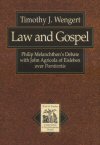
Explore the relationship between poenitenia and law in Melancthon’s theology during his spat with another one of Luther’s disciples—John Agricola of Eisleben. “Questions over the nature of poenitentia and its relation to the law and to the sacrament of penance,” writes Timothy Wengert, “formed the basis of the first public controversy among Luther’s students and profoundly shaped later Lutheranism by making the distinction between law and gospel one of its distinguishing characteristics.”
This contribution to the history of exegesis and to the study of Luther’s catechisms in their historical setting will add much to our understanding of the Reformation and will promote the discussion of historical and contemporary, practical issues of interest to historians, theologians, pastors, and laity.
—Robert Kolb, professor emeritus of systematic theology, Concordia Seminary, St. Louis, Missouri
Timothy J. Wengert is Ministerium of Pennsylvania Professor, Reformation History, at The Lutheran Theological Seminary, Philadelphia. He has pastored churches in Minnesota and Wisconsin. He is the author of Reading the Bible with Martin Luther: An Introductory Guide, Martin Luther’s Catechisms: Forming the Faith, and coedited The Book of Concord.
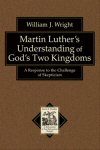
Reconsider Luther’s concept of the “two kingdoms” not as a polarization of secular culture and religious life, but as an acknowledgement of God’s lordship over all creation—including the private and public life of the believer. William J. Wright shows that Luther’s two-kingdom construction was not a justification for living irresponsibly or carelessly—but to live all areas of life in light of Jesus Christ.
This book offers a new proposal for the origin of Luther’s two kingdoms idea and a strong correction of recent scholarly interpretations of the idea.
—David VanDrunen, Church History
Professor Wright has offered us a learned and revolutionary new assessment of Luther’s understanding of the two kingdoms.
—David M. Whitford, professor of the history of Christianity, United Theological Seminary
By placing Luther’s concept against the background of his confrontation with skepticism, Wright produces a new vantage point for assessing Luther’s framework for guiding human action in this world.
—Robert Kolb, professor of systematic theology, Concordia Seminary, St. Louis
William J. Wright is professor of history and head of the history department at the University of Tennessee, Chattanooga. He is the author of Capitalism, the State, and the Lutheran Reformation.
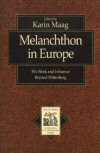
Study the heir of Luther’s legacy—Philip Melanchton. An enormously gifted theologian, Melancthon was a moderating voice in Lutheranism. Though his life and influence have not received the same attention as other Reformers, this collection of essays begins to rectify that short coming. They address Melancthon’s standing among both Lutherans and Reformed theologians, pinpointing where Melanchthon exercised his greatest influence. Essays include:
- “‘We Will Feast Together in Heaven Forever’: The Epistolary Friendship of John Calvin and Philip Melanchthon,” by Timothy Wengert
- “Wary Allies: Melanchthon and the Swiss Reformers,” by Bruce Gordon
- “Melanchthon’s Reception in Basle,” by Amy Nelson Burnett
- “Melanchthon As a Humanist and a Reformer,” by Deszo Buzogany
- “What Hath Wittenberg to do with Heidelberg? Philip Melanchthon and the Heidelberg Catechism,” by Lyle Bierma
- “Ordo Docendi: Melanchthon and the Organization of Calvin’s Institutes, 1536–1543,” by Richard A. Muller
- “Melanchthon’s Rhetoric As a Context for Understanding His Theology,” by John Schneider
- “Melanchthon between Renaissance and Reformation: from Exegesis to Political,” by Nicole Kuropka
Karin Maag is the director of the H. Henry Meeter Center for Calvin Studies in Grand Rapids. She has authored and edited three other volumes on the Reformation.
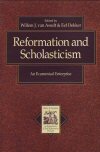
Consider the work of the world’s leading Reformation scholars as they examine the relationship of post-Reformation scholasticism to the intellectual heritage of the Reformation. These essays, taken from a colloquium held at Utrecht University, emphasize overlooked connections between these two major intellectual movements and make strides towards establishing direct links from Medieval scholasticism, the Reformation, and post-Reformation Protestant thought. Essays include:
- “The Problem of Protestant scholasticism—A Review and Definition,” by Richard A. Muller
- “Wittenberg contra Scholasticos,” by Cornelius Augustijn
- “Reformation and Scholasticism,” by Willem van’t Spijker
- “Scholasticism and Reformation,” by Antonie Vos
- “Thomism in Zanchi’s Doctrine of God,” by Harm Goris
- “An Ecumenical Debate between Reformation and Counter-Reformation? Bellarmine and Ames on liberum arbitrium,” by Eef Dekker
- “Traces of the Rise of Reformed Scholasticism in the Polemical Theologian William Whitaker (1548–1595),” by Frits G.M. Broeyer
- “John Owen: A reformed Scholastic at Oxford,” by Sebastain Rehnman
- “Gisbertus Voetius (1589–1676): Basic Features of His Doctrine of God,” by Andreas J. Beck
- “Cocceius Anti-Scholasticus?,” by Willem J. van Asselt
- “Puritan Theology as Historical Event: A Linguistic Approach to the Ecumenical Context,” by Carl R. Trueman
- “Scholasticism and Contemporary Systematic Theology,” by Luco J. van den Brom
- “Scholasticism and Hermeneutics,” by Bert Loonstra
Willem J. van Asselt is associate professor in the history of Reformed theology at Utrecht University in the Netherlands and professor at the Evangelische Theologische Faculteit, Leuven. He has written numerous articles and books on Reformed history, including Introduction to Reformed Scholasticism and The Federal Theology of Johannes Cocceius (1603–1669).
Eef Dekker is professor of history at Utrecht University.
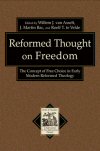
Reformed Thought on Freedom: The Concept of Free Choice in Early Modern Reformed Theology
- Editors: Willem J. van Asselt, J. Martin Bac, and Roelf T. le Velde
- Series: Texts and Studies in Reformation and Post-Reformation Thought
- Publisher: Baker Academic
- Publication Date: 2010
- Pages: 272
Discover the philosophical sophistication of the older Reformed position on divine sovereignty and human will. The texts in this book highlight the positive aspects of the Reformed tradition, and contributors demonstrate that traditional Calvinism cannot be easily dismissed as a form of philosophical determinism. Reformed Thought on Freedom will be valued by Reformation scholars, professors and students, and research and theological libraries.
An excellent contribution to the current remapping of the relationship of early modern Protestantism to late medieval theology.
—Carl R. Trueman, professor of historical theology and church history, Westminster Theological Seminary
Reformed Thought on Freedom is a model of patient, lucid scholarship. One can only hope that it has its desired effect on both historical scholarship of the period and the present debate concerning free choice.
—Brent Adkins, Sixteenth Century Journal
This book makes an important contribution to historical and systematic theology by taking an issue that is still hotly debated and presenting the views of thinkers who, though nearly forgotten now, were most influential within the continental Reformed tradition.
—Keith D. Stanglin, Calvin Theological Journal
Willem J. van Asselt is associate professor in the history of Reformed theology at Utrecht University in the Netherlands and professor at the Evangelische Theologische Faculteit in Leuven. He has written numerous articles and books on Reformed history, including Introduction to Reformed Scholasticism and The Federal Theology of Johannes Cocceius (1603–1669).
J. Martin Bac teaches classical languages in the Netherlandsand is the author of Perfect Will Theology: Divine Agency in Reformed Scholasticism as against Suárez, Episcopius, Descartes, and Spinoza.
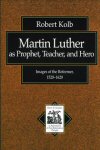
Despite the vast number of studies concerning the life and teaching of Martin Luther, scholars have not previously considered the ways in which his contemporaries and successors used his influence in the German Reformation. Professor Robert Kolb treats the subject in this well-researched volume on the continuing role of Luther’s legacy. The following generations of Reformers, he argues, used Luther in different ways as they sought to deal with the changed circumstances of the church in their own age.
Kolb suggests three categories to describe the ways in which Luther’s disciples used his influence and adapted it to the needs of the church in their respective ages: prophet, teacher, and hero.
Robert Kolb’s study of changing interpretations of Luther’s life and work is a valuable contribution to Luther studies. In particular, it demonstrates the impact of Luther on German theological thinking since the sixteenth century.
—John Johnson, president, Concordia Seminary
Professor Kolb has woven a fascinating tale about the effect of Luther on his theological heirs. This is a landmark study with which everyone interested in Luther studies will need to grapple.
—Timothy J. Wengert, Ministerium of Pennsylvania Professor of the Reformation History, Lutheran Theological Seminary, Philadelphia
Kolb’s study, written in his typically clear style and based on thorough research, is a valuable contribution to our understanding of the development of Lutheranism.
—Sixteenth Century Journal
For anyone interested in ‘how Luther after his death continued to function as an authority, as a teacher, and as a hero for those who claimed his name’ and how Luther’s heirs conceived ‘the nature of authority within the church . . . in the midst of a changing society,’ Kolb’s study is both unique and indispensable.
—Lutheran Quarterly
Kolb is a seasoned Reformation scholar and a leading expert on Lutheran developments in the century after Luther. His wide readings and careful research are reflected in this book, which does a real service in elucidating a complex but important period.
—Religious Studies Review
Robert Kolb is emeritus professor of systematic theology and director of the Institute for Mission Studies at Concordia Seminary in St. Louis, Missouri. He is the author of Luther and the Stories of God, The Christian Faith: A Lutheran Exposition, and coauthor of The Genius of Luther’s Theology.
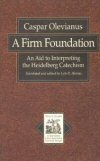
A Firm Foundation: An Aid to Interpreting the Heidelberg Catechism
- Author: Caspar Olevianus
- Editor: Lyle D. Bierma
- Translator: Lyle D. Bierma
- Series: Texts and Studies in Reformation and Post-Reformation Thought
- Publisher: Baker
- Publication Date: 1995
- Pages: 174
This commentary on the Heidelberg Catechism offers insight into one of the Protestantism’s most important catechisms. In this edition, Olevianus comments on the Lord’s Days 5 through 24. This study—aimed at pastors, students, and laypeople—is edited by one of the most competent scholars on this subject.
The translation is competent both in its rendering of the German text and its fluidity in English. Bierma has provided an excellent translation of a significant work by one of the key figures of the ‘second Reformation.’
—The Sixteenth Century Journal
Casper Olevianus (1536–1587) was one of the founders of the German Reformed church. He is the coauthor of the Heidelberg Catechism, and a commentary on the epistle to the Galatians.
Lyle D. Bierma is the Jean and Kenneth Baker Professor of Systematic Theology at Calvin Theological Seminary.
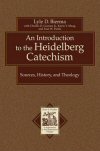
An Introduction to the Heidelberg Catechism: Sources, History, and Theology
- Author: Lyle D. Bierma, Charles D. Gunnoe Jr., Karin Y. Maag, and Paul W. Fields
- Series: Texts and Studies in Reformation and Post-Reformation Thought
- Publisher: Baker Academic
- Publication Date: 2005
- Pages: 224
Examine key aspects of the development of the Heidelberg Catechism, including historical background, socio-political origins, purpose, authorship, sources, and theology. The book includes the first ever English translations of two major sources of the Heidelberg Catechism—Ursinus’ Smaller and Larger Catechisms—and a bibliography of research on the document since 1900.
An Introduction to the Heidelberg Catechism is a valuable addition to studies on the magisterial catechism ratified at Heidelberg.
—Joel R. Beeke, president and professor of systematic theology and homiletics, Puritan Reformed Theological Seminary
The various authors make distinctive contributions toward understanding the background and theology of the catechism with the centerpiece being the translations of Ursinus’ two catechisms, which provide fascinating parallels to the Heidelberg Catechism itself.
—I. John Hesselink, Albertus Van Raalte Professor of Theology, emeritus, Western Theological Seminary
This book will leave those unfamiliar with the Heidelberg Catechism wondering how they could have missed a theological gem of such brilliance. Rarely does a book about a classic text do justice to the original.
—Darryl Hart, director of fellowship programs and scholar-in-residence, Intercollegiate Studies Institute
These pages are a treasure store of information on one of the truly great documents of the Reformed church.
—Sinclair B. Ferguson, professor of systematic theology, Westminster Theological Seminary
The book provides an indispensable research tool for the study of a document which not only has considerable historical significance, but continues to have importance in Reformed Churches with a German or Dutch origin.
—Ecclesiastical History
Lyle D. Bierma is the Jean and Kenneth Baker Professor of Systematic Theology at Calvin Theological Seminary.
Charles D. Gunnoe Jr. is provost, dean of the faculty, and professor of history at Aquinas College. He is the author of Thomas Erastus and the Palatinate: A Renaissance Physician in the Second Reformation.
Karin Maag is the director of the H. Henry Meeter Center for Calvin Studies in Grand Rapids. She has authored and edited three other volumes on the Reformation.
Paul W. Fields is theological librarian and curator of the Meeter Center at Calvin College.
About Richard A. Muller
Richard A. Muller is P.J. Zondervan Professor of Historical Theology at Calvin Theological Seminary in Grand Rapids, Michigan. He is one of the most distinguished Reformation scholars in the world. He is the author of Calvin and the Reformed Tradition: On the Work of Christ and the Order of Salvation, Post-Reformation Reformed Dogmatics, Christ and the Decree: Christology and Predestination in Reformed Theology from Calvin to Perkins, The Unaccommodated Calvin, and After Calvin: Studies in the Development of a Theological Tradition.
This title is included in the following collections
You can save when you purchase this product as part of a collection.
Baker Ultimate Collection 2022...
$38,273.89$30,599.99
Richard A. Muller received his Ph.D. from Duke University. He is P. J. Zondervan Professor of Historical Theology at Calvin Theological Seminary and the author of several books, including Church History: An Introduction to Research, Reference Works, and Methods and Dictionary of Latin and Greek Theological Terms.
Reviews
2 ratings

Jintae Seok
11/4/2024

Daniel Caballero
10/13/2017